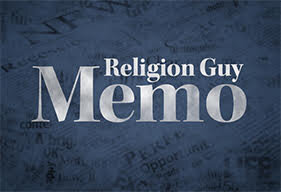Conservative Catholic news outlets have thoroughly covered growing turmoil in Germany’s Catholic Church, making available solid backgrounding for “mainstream” media who’ve generally been sluggish in picking up on this story.
That neglect presumably won’t last, considering factors The Religion Guy will not underscore for colleagues’ consideration.
A significant phalanx of German bishops, united with prominent lay activists, seem intent on revisionist change to come from their “Synodical Way” project, which the Vatican has sought to suppress, so far without success.
The German go-it-alone demands set up an inevitable showdown with the Holy See. The global repercussions were captured in a blunt Wall Street Journal headline April 16: “Can Pope Francis Head Off a Schism?” One week earlier a headline in the conservative National Catholic Register declared that “U.S. Theologians Echo Fears of Schism in Catholic Church in Germany.”

The Religion Guy proposes a different hed that uses the P-word rather than the S-word: Will German Catholicism Go Protestant, Five Centuries Late?
Peg-hunting reporters will want to watch the “wires” (to use an anachronistic term) May 10 for the latest pageant of defiance. On the heels of the Vatican’s papally-approved statement reaffirming opposition to church blessings and marriages for same-sex couples, a large network of German Catholics — with clergy involved — plan to stage same-sex blessing ceremonies across the nation. Watch for how many bishops are silent, or even pleased, when their priests are willing to participate.
The LGBTQ issue is only one aspect of the German imbroglio that dates from the 2019 launch of the “synodical” process, which is co-sponsored by the German Bishops’ Conference and the Central Committee of German Catholics, an influential group of lay activists.
Matters have now reached a new precipice with release of the “Fundamental Text” that proclaims a “deep crisis” in Catholicism and sets the ground for final policy-setting at a “synodal assembly.” Leaders put the document online for insiders January 22 and a must-read English translation has since been posted for the general public (free access, with registration required).
The Fundamental Text asserts that the church appears “regressive” and harms its “credibility” due to “experiences of discrimination and exclusion, … especially in the field of gender justice, in the evaluation of queer sexual orientations, and in dealing with failure and new beginnings.” Translation: That last phrase refers to the ban on Communion for most divorced Catholics in second marriages.
Also on the agenda for consideration and synod voting, despite long-standing Vatican efforts to end discussion, are ending mandatory celibacy for priests and “open access for women to the ordained ministry” as priests as well as deacons. Regarding Pope John Paul II’s decree upholding the traditional gender barrier, “his argumentation and the validity of his statement are often questioned.”
Those nagging but familiar issues are mere examples stemming from the central demand, namely a dramatic power shift away from bishops and priests through wholesale democratic restructuring. These demands result largely from revulsion over unending scandals of priests’ sexual molestation of underage Catholics in Germany and worldwide.
In a word, Catholicism, in Germany if not elsewhere, would go Protestant.
“Inculturation into a democratic society based on the rule of law” means “abuse of power” would end as lay members participate fully in policy-making and assignment of parish priests. With the pope’s cooperation, bishops would be elected with participation to fixed terms and be subject to re-election or dismissal. “Separation of powers” based on the democratic model would dilute bishops’ powers. Rulings of bishops and priests would be subject to majority veto.
As for doctrine, “ambiguity” would rule because “no one form of thought” can “lay claim to ultimate authority.” Various “legitimate views and ways of life can compete with each other even in core convictions.”
No examples are provided in the text.
For religion reporters of a certain age, this brings memories of the U.S. bishops’ “Call To Action” project to mark the 1976 American bicentennial.
Two years of regional hearings involved testimony from 800,000 Catholics, culminating in a three-day Detroit confab with 100 bishops and some 1,200 lay delegates. In addition to decrying social ills, the majority voted for German-style re-evaluation of priestly celibacy, women priests, gay sexuality and lay involvement in church decision-making. The Americans’ insurrection faded, but that doesn’t mean the German one will.
Political tidbit: On a Vatican reporting trip The Guy asked a ranking cardinal whether the 1976 furor had damaged the career prospects of Cincinnati Archbishop Joseph Bernardin, president of the U.S. bishops when “Call to Action” was launched. Oh, no, he explained, because Bernardin carefully briefed Rome in advance on precisely how and why matters got out of hand.
Surprises were the worst sin. Bernardin later won the Chicago appointment and a cardinal’s red hat from Pope John Paul II.
FIRST IMAGE: Screenshot from “Is Catholicism about to break into three?” commentary at Crux.










